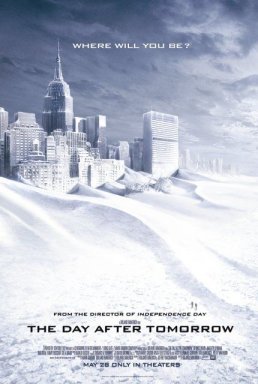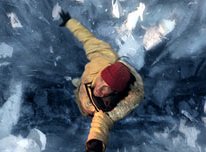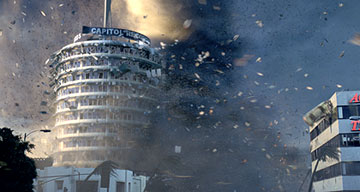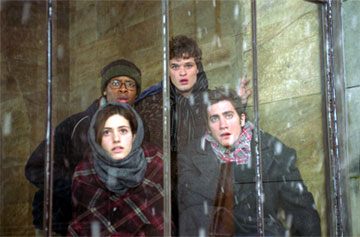|
The Day After
Tomorrow
"It could happen
a hundred years from now. It could happen a thousand years
from now. All I know is that our children and grandchildren
are going to pay the price."
So says paleoclimatologist
and father of one Jack Hall, played by Dennis Quaid at his
most earnest in an early scene from The Day After Tomorrow.
If he'd only known the title of the film, Hall might have
been able to make a better prediction. As it is, of course,
he has to make an impassioned speech about global warming
plunging the world into another Ice Age without knowing
how right he is.
But he's also
wrong. It's not our children and grandchildren that will
pay the price. It's way too many people this weekend who
will part with their ten dollars to see this terrible movie.
It's possible
that The Day After Tomorrow may accidentally trick
people into understanding what Al Gore was talking about
last year when he gave a speech about Global Warming on
the coldest day in New York City's history. But it's about
as boring as a pre-"angry" Gore speech, even with a few
random but intense scenes of bystanders getting hit by nature
gone amok, the film is just about as boring as Gore.
Director Roland
Emmerich may have good intentions; in a strange way, it's
likely that he has passion for the subject of this film.
Unfortunately, Emmerich substitutes a seesaw between eco-political
polemic and cool special effects for anything resembling
a narrative.
If you doubt
his political points, you're not paying attention. Whereas
Emmerich's previous disaster film, Independence Day,
had Bill Pullman play a rugged U.S. President more Kennedy-esque
than modern-day, The Day After Tomorrow has a weak
but good-looking and charming guy (Perry King) that defers
to his villainous Vice-President Becker (Kenneth Welsh,
a ringer for Dick Cheney). King may look like Gore, but
his mumbling is pure faux-South.
As for the Vice-President,
well, down in Whoville they say that his heart grew three
sizes that day …after tomorrow.
From the opening
scene in the Antarctic, it's clear that spectacle is meant
to carry us past the pseudo-science and dwelling on the
hollowness of the script. Hall's scientific team takes core
samples in the middle of a vast white wasteland, when suddenly
the ground cracks, and part of the ice shelf just …falls
away, as Hall makes a couple of superhuman leaps to save
equipment. All very thrilling, but also very hollow, because
we haven't been given the slightest chance to care about
any of the team yet.
That problem
keeps pace throughout the film. Whenever something like
characterization rears its ugly head, Emmerich quickly throws
in a couple of clichés and then runs like hell for a CG
shot. To give us a human element, he even stoops so low
as to present Peter, the bald sick child, stricken by an
ailment so sympathy-inducing as to not be worth naming.
Hey, if you're not moved by a scene of Sela Ward reading
to him from Peter Pan, you can just …hey! Look! The
Hollywood sign just got wiped out by a tornado!
Emmerich could
be a good director, if not a great one. He certainly has
the skill to let his pictures tell the story. Every now
and then a quiet scene will happen that makes you realize
how close he comes to being competent. But then it's back
to pelting actors with hail the size of bowling balls. Then
showing an amazing tidal wave wash over New York City. Then
a flash-frozen Statue of Liberty.
Heck, even the
timber wolves running amok are generated by a computer framing
their fearful symmetry. (At which point, yeah, I wanted
a tiger. Why not take it that one step further into ridiculousness?)
The money shots
all feel like we've seen them before, and of course, we
have. Emmerich has the same tumbling car shot from Independence
Day wipe out a Los Angeleno, but in the earlier film,
we had a stake. Harvey Fierstein had a certain charm, and
we felt his loss. Here, it's just another guy in a panic.
And then Emmerich wipes out another guy in a panic,
and another and another. The actors might as well be computer
generated themselves.
And yet they
do the best they can. Quaid is believable as a father, if
not necessarily as a brilliant scientist. Clearly staking
a claim for his sunset years, Ian Holm has a certain charm
as Terry Rapson, one of the few other scientists to believe
in Quaid's character. It is Holm's voice in the trailer
uttering "…save as many as you can," and despite the melodrama,
it comes close to being moving in context.
To pull in the
youth market, Emmerich has Jake Gyllenhaal and Emmy Rossum
as high school students eventually trapped in the New York
Public Library. Both have charisma, if not much depth, and
it's somewhat believable that Gyllenhaal could be the product
of Quaid and Ward. But they're all still just meat puppets,
if not meat for the wolves.
There could
be an important message here, and more frustratingly, Emmerich
actually has the seeds of a more interesting film in the
aftermath, as everyone has to move to more equatorial climes.
But I just don't want to take the chance on The Day After
The Day After Tomorrow.
Rating:

|









